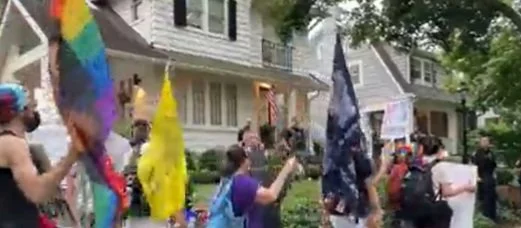In the hot issues like Abortion and Euthanasia, advocates repeatedly cite the “hard cases” and appeal for empathy and compassion, so they can manipulate us through our emotions. They have to distract us from scrutinizing their shabby logic.
In 1904 the US Associate Supreme Court Justice, Oliver Wendell Holmes Jr. noted:
“Great cases like hard cases make bad law. For great cases are called great, not by reason of their importance...but because of some accident of immediate overwhelming interest which appeals to the feelings and distorts the judgment.”
Ireland experienced this during the referendum on the Eighth Amendment, in 2018. That debate pivoted on the hard cases of Rape, Incest and Fatal Foetal Abnormality. (There was also proxy rejection of Catholicism from people’s disgust with the child abuse perpetrated by Catholic priests.) The repeal of the Eighth removed all legal protection for the unborn child and, as a consequence, abortion was legalized.
These hard cases are tragic, but only a minority of the 6,666 abortions performed in 2019 were in any of those categories. The vast majority were elective abortions — the killing of a healthy, but inconvenient human child. Some who voted for the Repeal now feel they were ‘had’ because they were sold abortion as being “safe, legal and rare” for the extreme cases — instead, they got Abortion-on-Demand.
When discussing these issues and someone responds with name-calling, ad hominem, or a commentary about your tone, they probably have no valid argument supporting their position. Even contradiction is a feeble response!
After seeing people getting savaged on Anti-Social Media threads, Paul Graham Ph.D. defined the ‘Hierarchy of Disagreement.’ The pyramid goes from base name-calling to the pinnacle of clearly-stated rationale. This tool can help us to focus on the arguments / discussions / social-media threads to see which add value to the debate.
The Hierarchy of Disagreement by Paul Graham Ph.D.
Euthanasia advocates target our empathy and compassion by focussing on the cases with “unremitting pain and suffering.” This is almost always mentioned, despite the control of pain being a major success of modern Palliative Care. Mostly, a request for death is a vain attempt to regain a sense of personal autonomy or control or ‘dignity’, and to reduce dependence on others. Pain, or the fear of future pain, is an infrequent reason people choose to die.
That brings us to the arguments supporting Assisted Suicide and Voluntary Euthanasia [AS/VE.]
“Human beings have an explicit right to die”
Death is inevitable and individuals have the freedom — the free will — to kill themselves. That does not translate into an “explicit right to die.” If you agree that humans have an explicit right to die, logical extension means that you also agree with Suicide-on-Demand — for everyone! (because Human Rights apply to every human being.)
Presenting Euthanasia as a “Right” negates our natural instinct to stop someone else from hurting or killing themselves out of despair. Decades of suicide prevention are being flushed down the toilet. More than 2000 years ago, Hippocrates knew that killing a patient did not end well, even though they had pitifully few effective medications in those ancient times.
If you think the “slippery slope” does not exist just look at what is happening in Holland or see how the Supreme Court of Canada’s 6-year-old framework for Medical Assistance in Dying [MAiD] has already been altered beyond recognition, with more changes afoot. Suicide-on-Demand is patently the endpoint in the Netherlands, Belgium, and Canada. There is a cold logic for a country to cull the terminally ill and very sick, but to kill able bodied citizens is crazy.
“Death is a private matter”
This, literally, can only apply to a hermit without friends or family, living in some desolate place which is devoid of all human contact. Even superficial relationships connect humans to each other so there is almost no such thing as a truly “private death.”
Each man's death diminishes me, for I am involved in mankind.
Therefore, send not to know, for whom the bell tolls, it tolls for thee…”
John Donne.
Before we embark on such a ghastly route, we must see proper long-term studies on the effects of AS/VE on the spouses, friends and especially the children who remain to pick up the pieces of life. There must be devastating long-term consequences on these people.
“Allowing people to die may free up scarce health resources”
In the elderly this is called ‘senicide’ or ‘geronticide’: “the killing of the elderly or abandonment to death.” (Which dovetails with the over-population paranoia mentioned below.)
Many sneer at the former Inuit practice of senecide: “In earlier times the Inuit would leave their elderly on the ice to die. Senicide among the Inuit people was rare, except during famines. The last known case of an Inuit senicide was in 1939” Now, in “modern” Canada, it seems perfectly fine to offer 42-year-old Roger Foley voluntary euthanasia, even though he wishes to live!
(How modern is that?)
“Euthanasia will happen anyway”
Yowzer.
Murder and theft also happen, so now we must legalize murder and theft?!
If Euthanasia is illegal and a small number of cases occur, they will be easier to identify and to correct, than if AS/VE was legal and widely accepted.
“A right to control his/her body and life”
This is the Absolute Bodily Autonomy Theory (which is also used by the pro-aborts.) The assertion is that each of us has the right to determine, at what time, and in what way, and by whose hand, we will die.
The autonomy question as ‘a Right’ is answered above, but this brings in 2 other important points. The devaluation of all life through AS/VE and the “greater good of society.”
We all lose a little when another human being dies. To participate in the killing of that person means that we too have valued them less because, in essence, we confirm they are better off dead (NULL value. Void.) That belittles our own life.
If an individual has absolute control of their own body, then it is acceptable to intentionally damage that healthy body. There is a small group of able-bodied people suffering from Body Integrity Disorder. This condition gives the profound delusion that they are meant to be disabled. Some wish to amputate a healthy limb or limbs: others wish to be paraplegic. Collusion with such a profound delusion cannot be appropriate in a functional society: medical procedures must not intentionally harm or disable.
There are many times where a country or state insists on health measures for the well being of society as a whole. COVID-19 precautions are a good example! In some places, childhood vaccination is mandatory. People suffering from mental illnesses who pose a risk to themselves or others can be treated without consent and the list goes on.
As a final point, it seems disingenuous to demand absolute bodily “Autonomy” and then demand that some other person must do the deed for you...
“It is possible to regulate euthanasia”
Rubbish! The evidence from the Netherlands clearly shows that legislation can be ignored. (And “tight regulation” is used as a reassurance to opponents of AS/VE pre-legalization rather than as a rational argument in favour of legalization. Just like “safe, legal and rare.”)
When regulations are ignored, the vulnerable are put in jeopardy. Doctors should ensure the safety of our patients — not put them to death.
Our judicial system is based on the principle that 10 guilty people should go free to protect even 1 innocent person. In the context of AS/VE it seems curious that as a society we seem ready to accept coercion (i.e. Roger Foley); ignore some patient incompetence (really “they would have wanted it”); and dismiss some collusion between colleagues or within families.
“The right to life is: a right to life with a minimum quality and value”
No-one is ever guaranteed a “minimum quality or value of life.” For want of a better phrase, life is a crap-shoot!
Then, comes the question as to whom would define this minimum quality and value? Is it to be based on Western values ($, € and £!?!) or is there a different standard for say, a Kalahari Bushman?
“There is no line”
Surprisingly this might be the strongest argument. Post-modernists contend that there are no absolute principles: maybe!
Even many secular atheists, believe that every human being has fundamental value and dignity. That may be why, in 1948, no country voted against the United Nations Declaration of Human Rights which delineates our Right to Life. Dignity is inherent and the Right to Life is an absolute principle.
Conclusion: The Culture of Death
Attacks on human life are happening at every stage of human development. (https://wherepeteris.com/the-gospel-of-life-is-at-the-heart-of-jesus-message/)
The calls for Assisted Suicide & Voluntary Euthanasia seem related to the shabby idea that the world must be urgently de-populated of its ‘most destructive’ species — Homo Sapiens! Sir David Attenborough said that “we have overrun [the world]” but thankfully he did not stoop to the drastic solution proposed by authors Ehrlich, Ehrlich & Holdren in ‘Ecoscience’: “…if people did not choose to stop having kids, it was worth considering having government do it for them. They advocated a Planetary Regime, and with it the prospect of forced abortion and sterilization.
Yowzer.
Sometimes dying is difficult and unpredictable: access to expert Palliative Care must be available to everyone. Assisted Suicide and Voluntary Euthanasia can make dying to appear clean, neat and tidy, especially when the person is surrounded by family, tended by caring nurses as the fatal poison is quietly administered by a supportive doctor.
Perhaps we are missing the point that Dying is an essential part of LIFE.
Dr. Kevin Hay.
Kevin is a UCD grad and a rural Family Doctor in Alberta, Canada.
You can follow him on Twitter @kevinhay77 (though please be careful on (Anti)-Social Media!)
Related Articles:
· A Canadian perspective on Voluntary Euthanasia.
https://www.catholicarena.com/latest/euthanasiabill
· A detailed review of the Dying with Dignity Bill 2020.
https://www.catholicarena.com/latest/2020/10/15/dyingwithdignitybill












Shocking.